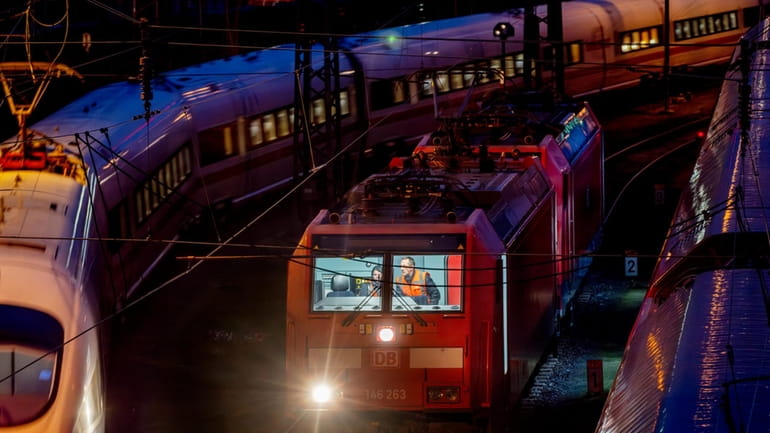Deal to end German rail strikes features a 35-hour work week with an option to work longer

Two train drivers sit in the cockpit of a parked train outside the central train station in Frankfurt, Germany, Tuesday, Jan. 23, 2024. Train drivers and some other train crew for Germany’s main national railway operator will see their working week reduced from 38 hours to 35 by 2029 without having their pay cut, but will have an option to work longer for more money, the two sides say. Credit: AP/Michael Probst
BERLIN — Train drivers and some crew for Germany's main railway operator will see their working week reduced from 38 hours to 35 by 2029 without having their pay cut, but will have an option to work longer for more money, the two sides said Tuesday.
The arrangement is central to a deal that state-owned operator Deutsche Bahn reached Monday with the GDL union, which represents many of its drivers and some other workers, after five months of negotiations punctuated by strikes.
Several pay disputes in the German transport sector have coincided recently, and this was the most consistently disruptive. Others have involved local transport workers, ground staff and cabin crew for Lufthansa and airport security staff.
The rail strikes led to most long-distance and many regional trains being canceled, in some cases for days at a time in Europe's biggest economy.
The main sticking point was GDL’s demand for working hours to be reduced without a pay cut. Some smaller private operators that operate regional services agreed to the demand, but Deutsche Bahn initially balked.
The two sides' deal foresees standard working hours being reduced to 35 hours in four stages from 2026 to 2029. But employees will be able to choose anything from a 35- to 40-hour week, with those who choose to work longer getting more pay.
The agreement also features a pay rise totaling 420 euros ($455) per month in two stages and a one-time payment of 2,850 euros to compensate for inflation.
Deutsche Bahn personnel chief Martin Seiler described it as “an intelligent compromise” offering the company flexibility and extra capacity “in the difficult labor market environment.” The company had pointed to the difficulty of recruiting more drivers to cover gaps created by a shorter week.
GDL chairman Claus Weselsky said the shorter work week was “urgently necessary” to attract more employees to the railway.
